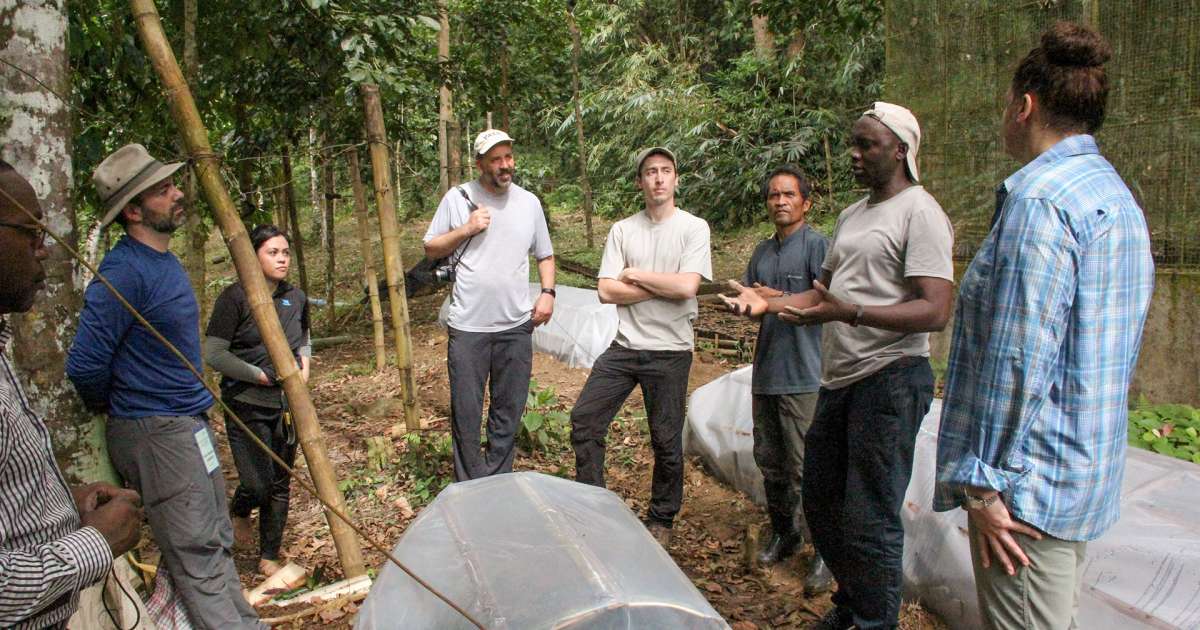YSE Certificate Programs Advance Climate Solutions and Careers
The Cox’s Bazar region in Bangladesh is home to Cox’s Bazar Beach — the longest natural sea beach in the world and the country’s top tourist destination. In recent years, it has also become the site of two of world’s most densely populated refugee camps, as about 919,000 Rohingya refugees have fled violence and persecution in Myanmar. Since the start of the crisis, Md. Ehsanul Hoque, an environmental officer with the U.N. Refugee Agency, has worked long days, spilling into long nights, to promote environmental protection in the camps. In 2019, he enrolled in the Tropical Forest Landscapes: Conservation, Restoration & Sustainable Use (TFL) online certificate program offered through the Environmental Leadership & Training Initiative (ELTI) at the Yale School of the Environment. His goal, he says, was to gain a better understanding of “regeneration potential, restoration approaches, and stakeholder engagement.”
Halfway across the world, the desire to be part of an innovative space in the clean energy sector led Giselle De Grandis, a former senior policy advisor for the Ontario Ministry of Energy and Transportation, to enroll in Financing and Deploying Clean Energy (FDCE), the online certificate program offered by the Center for Business and the Environment at Yale (CBEY). Now, a strategic innovation manager at Hydro One, Ontario’s largest electric utility, she is developing an innovation strategy that engages Hydro One’s various business units and launching an innovation council and center of excellence. “I want to get us faster at piloting new technologies and processes and scaling the successful ones for maximum impact,” says De Grandis, who credits the FDCE certificate program with helping her make “the jump from government policy to utility strategy at a key inflection point for utilities.”
Both certificate programs are going into their fourth year, and both are highly rated by past participants. Over 400 working professionals from 27 countries have participated in the FDCE program, with 117 participants from 21 countries making up the 2023 cohort. TFL has had 191 professionals from 55 countries complete its program, with 74 new participants from 29 countries making up its 2023 cohort. Like De Grandis and Hoque, participants are often looking to strengthen existing skills, develop new knowledge outside of their own areas of expertise, or access professional networks that otherwise might be unavailable to them.
“The online certificate programs were developed because there are working professionals worldwide who are eager to have access to the type of advanced environmental education and training that we can offer, and many of them are not able to, or don’t want to, enroll in a graduate degree program,” says Indy Burke, Carl W. Knobloch, Jr. Dean of the Yale School of the Environment.
Interest in the admissions-based programs, which offer a mix of self-directed coursework and weekly live sessions taught by YSE, Yale, and external experts in their field, has continued to increase from almost every area in the world. This year, the programs were able to offer scholarships to qualified applicants from the Global South thanks to the newly launched Three Cairns Climate Program for the Global South at YSE. TFL enrolled 16 participants as Three Cairns Fellows in this first year, while FDCE enrolled five Fellows.
From Bangladesh to Madagascar: Creating Enduring Change
Participants in the TFL program, who come from a wide range of government agencies, academic institutions, and NGOs, take core courses in topics such as land-use strategies, human dimensions, and financial concepts, and complete a capstone project. They also have the option to complete a one-week, immersive field course in a tropical forest setting, which gives participants an opportunity to share the experiences of landholders and others who are implementing innovative interventions. The goal of the TFL program as a whole is to challenge participants to think critically about what it takes to make their project plans actionable, says ELTI Director Eva Garen ’95 MESc, ’05 PhD.
“When they finish the program, participants have an implementable project that they can then put into action or find funding to support. The progress they make over the year is impressive and generates enduring changes in the landscapes where they are focused,” Garen says.
That is certainly the case in the Cox’s Bazaar region, where Md. Ehsanul Hoque has utilized skills acquired in the TFL certificate program to help restore the landscape and lessen the environmental impact of forced migration. As of July 2021, vegetation on 1,100 acres of degraded land had been restored, and the demand for firewood was reduced by as much as 80% by providing alternative fuel sources. The operation has been so successful that the UNHCR has tabbed Bangladesh Refugee Operation as a model for climate action for other operations in Asia and the Pacific to follow.
“The online certificate program provided a step-by-step approach and processes that helped me to understand the problem from the perspective of a ‘socio-ecological system,’” Hoque says. “The program also helped me develop indicators to measure progress and communicate how stakeholder needs were being met.”
But ultimately, the biggest benefit of this program will be for Madagascar, where building our capacity to handle environmental challenges is a national priority and must be strengthened.”
Sometimes, it’s not just project plans, but the participants, who find themselves being made “actionable.” After completing the TFL program, fellow 2020 participant Herintsitohaina Razakamanarivo, a professor at the University of Antananarivo, Madagascar’s primary public university, was quickly recruited to manage staff for the country’s Ministry of Environment and Sustainable Development. A place of unique biodiversity and natural features, the island nation, located 250 miles off the coast of East Africa in the Indian Ocean, is struggling to adapt to a changing climate.
“In my position, I used knowledge and skills — particularly strategy development, networking, and fundraising — to lead the design of a 10-year strategic plan for the ministry, develop and implement a new national environmental program, and help establish new environmental policy,” Razakamanarivo says.
She has since returned to the university, where she is a researcher and lecturer specializing in forestry and soil sciences, with a particular research focus on climate change, land degradation, and food security. Razakamanarivo says she continues to use skills she gained in the TFL program in her academic career.
“I had been looking for years for a program like this… It gave me new insight into my duties as a professor and allowed me to be part of the decision-making process for the future of the ministry.
“But ultimately, the biggest benefit of this program will be for Madagascar, where building our capacity to handle environmental challenges is a national priority and must be strengthened,” Razakamanarivo says.
Human Capacity and Leadership
While the significant federal investment in clean energy and renewables incorporated in the Inflation Reduction Act has been widely applauded by clean energy advocates, over at FDCE they are accustomed to thinking in terms of an ongoing global energy transition that requires, above all, human capacity and leadership. “The International Energy Agency estimated that $3.5 trillion per year in energy investments would be required until 2050 to offset the rise in carbon emissions. Of these, approximately $1 trillion per year must be dedicated to the deployment and financing of clean energy,” says CBEY Executive Director Stuart DeCew ’11 MEM/MBA. “At FDCE, our theory of change is that through online education, we can almost immediately equip those working in the energy sector across the globe to accelerate a clean and just energy transition.”
Yale School of Management Lecturer Richard Kauffman, chairman of the New York State Energy Research and Development Authority, interviews Bert Hunter, chief investment officer of the CT Green Bank, on innovative financing techniques for clean energy development on January 27, 2020. Segments from the interview were incorporated into the FDCE program curriculum.
With core course modules in policy, finance, technology, and innovation, FDCE’s courses are designed to help working professionals gain fluency in areas outside of their own area of expertise — engineers, for example, who understand clean energy finance, or policy analysts who can evaluate technology.
“The general FDCE approach is to find the right balance between engaging videos, readings, and interactive online discussions to keep our online cohort of working professionals excited, interested, and not overwhelmed — because they all have full-time jobs,” says Rob Klee ’99 MEM, ’04 JD, ’05 PhD, who leads the energy policy portion of the course. “I am particularly excited about the Thursday hour-long live sessions during which I get to interview a guest expert from the energy policy world. It’s an opportunity to bring the clean energy news of the day into the FDCE ecosystem.”
Miles Braxton was a business development analyst at Washington, D.C.-based solar finance and development firm Sol Systems when he enrolled in the FDCE program in 2020. He wanted to get some formal training in clean energy project finance to help him transition to a role at an asset management or investment firm that owned or acquired renewable energy projects.
“I enrolled in FDCE primarily for the project finance module. Learning how to do a sensitivity analysis (also known as a what-if analysis) within a financial model was mind-blowing at the time, and a tool I still use today,” he says.
Two years later Braxton achieved his goal when he joined Goldman Sachs Renewable Power Group (now MN8 Energy) as a rotational analyst. There, he managed the group’s insurance and its Environmental, Health, and Safety program, which encompassed over 880 projects in 27 different states. That experience led him to his current role as director of risk management at Summit Ridge Energy, one of the largest owner-operators of community solar assets in the U.S.
I enrolled in FDCE primarily for the project finance module. Learning how to do a sensitivity analysis (also known as a what-if analysis) within a financial model was mind-blowing at the time, and a tool I still use today.”
Braxton says his FDCE network, particularly the connection that he made with fellow participant Sara Kane ’07 MEM/MBA, then a managing director at the insurance brokerage firm Beecher Carlson, played an important role in his transition to risk management.
“I remember my first conversation with Sara. She told me she worked in renewable energy insurance, and I laughed at the response, claiming I had no idea insurance existed in the industry,” Braxton says. “Only two years after that moment, I found myself managing the largest renewable insurance portfolio in the U.S. Having the ability to call Sara (now a co-leader of the power & renewables department at CAC Specialty) with a question any time, no matter how simple, as an unbiased professional resource and a trusted friend was one of the biggest reasons for my success in risk management.”
Soon after completing the FDCE certificate program, Braxton co-founded BlackOak Collective with the purpose of establishing a Washington, D.C.-area network of Black professionals, students, and advocates within the sustainability space. Braxton says what began as a regional organization has evolved into a national presence through partnerships with leading companies and nonprofits looking to diversify their applicant pools. The organization recently launched its Green Gateways program to build the pipeline of Black students into sustainability positions through presentations at colleges, universities, and HBCUs.
People of color make up about 27% of the clean energy workforce in the U.S., according to a report by the nonpartisan group E2 and other energy organizations — slightly higher than the overall U.S. labor force (22%) and fossil fuels overall (26%). FDCE has been working to bring the demographic composition of the program’s participants in line with the energy workforce, with 47% of the current cohort identifying as people of color. “As we continue to grow the program, a key focus will be on admitting diverse cohorts of energy professionals which, hopefully, helps to build a diverse clean energy workforce,” says Coral Bielecki ’18 MESc, CBEY’s online programs director.
New Haven Nexuses
Finding the new opportunities to grow and build networks across Yale and externally have been a priority for both programs. In February, TFL launched a Coursera course, “Tropical Forest Restoration 101,” based on their full certificate program. “We have already been able to reach more than 2,500 people through this course,” says Karin Bucht ’15 MF, program manager at ELTI who helped launch the MOOC-style course. “It has been exciting to find new ways to reach a broader audience and raise awareness on course themes.”
Both FDCE and TFL participants have been serving “clients” for YSE practicum courses, and Gillian Bloomfield ’10 MFS, program manager at ELTI, notes that students are thrilled to have their coursework “rooted in real-world examples that help affect positive environmental change on the ground.”
“In terms of immediate impact, participant satisfaction, and global reach, it’s hard to top these two programs,” says Dean Burke. “Their record of success is why we are so excited that funding provided through the Three Cairns Climate Program for the Global South not only expands access to these remarkable programs, but also will support the development of new certificate programs relevant to the Global South.”













